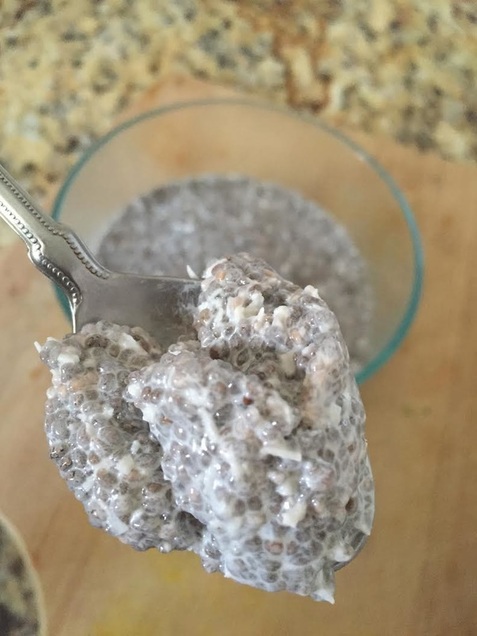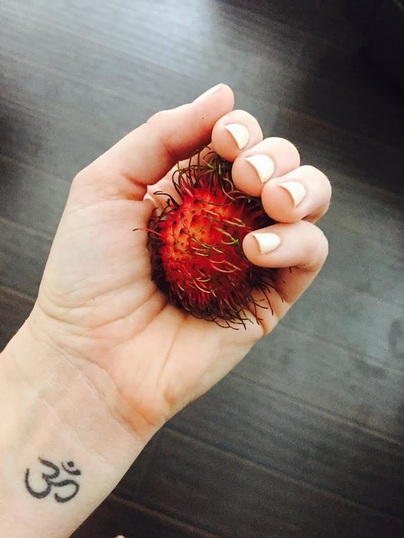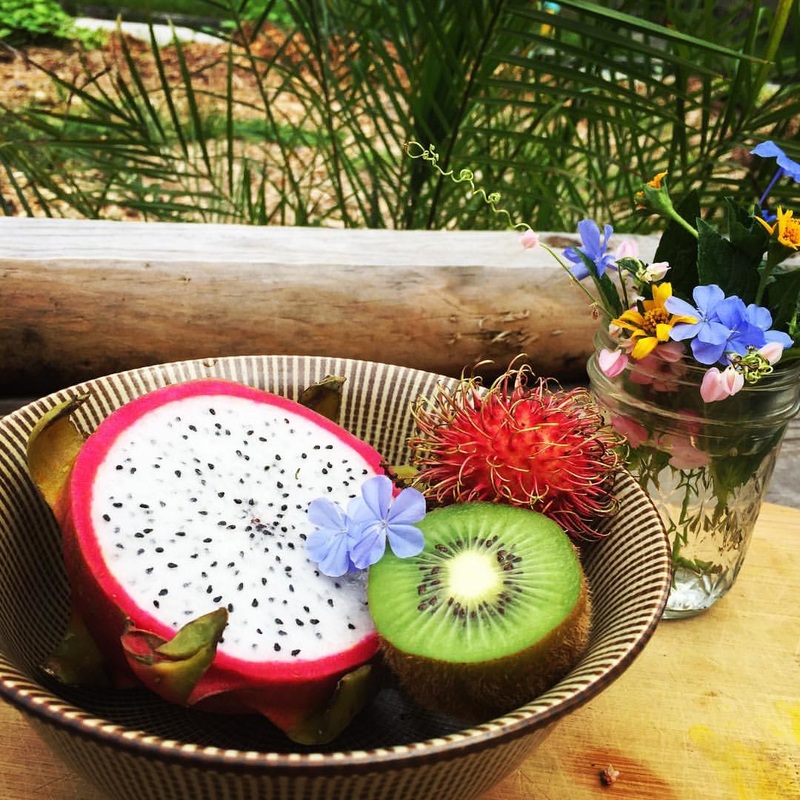Did you know....Chia seeds are a whole grain food. Chia seeds are naturally gluten free and are typically grown non-GMO and organic from the plant Salvia Hispanica. This plant grows natively in South America. Historically, chia seeds were very important for the Maya and Aztec peoples. "Chia" is actually the ancient word for "strength". These seeds are tiny indeed, however, are actually one of the most nutritious foods on the planet! They have tons of fiber, omega-3's, protein, vitamins and minerals and are considered a "sattvic" or pure food.
CHIA SEEDS FROM AN AYURVEDIC PERSPECTIVE: Chia is an excellent food that helps to improve hydration at all tissue levels. From an Ayurvedic perspective, chia attenuates, or reduces, vata (the air and space element), optimizes pitta (the fire element) and nourishes kapha (the water and earth elements). Chia seeds are also sattvic, or pure, in nature.
According to Ayurveda, sattvic foods are ones that cultivate and promote clarity and equanimity of the mind, while also benefiting the body. Cultivating deep hydration using sattvic foods and herbs also helps to encourage the building of ojas, which is your core vitality, endurance, sustainability, and the foundation of your immunity. Therefore, you can use chia seeds, or other Omega-3 sources such as hemp or flax, as sattvic dietary sources to cultivate ojas.
CHIA SEEDS FROM A WESTERN NUTRITION PERSPECTIVE:
1 ounce (28 grams ~ 2Tbsp) serving of chia seeds contains:
Fiber: 11 grams.
Protein: 4 grams.
Fat: 9 grams (5 of which are Omega-3s)
Calcium: 117mg
Manganese: 0.6mg
Phosphorus: 265mg
Potassium: 44.8mg
Sodium: 5.3mg
They also contain a decent amount of:
Zinc, Vitamin B3 (Niacin), Vitamin B1 (Thiamine) and Vitamin B2
Chia seeds have lots of antioxidants, which actually help protect the sensitive fats in the chia seeds from going rancid. As we know, the effectiveness of getting anti-oxidants from food sources is much better than in supplement form. Anti-oxidants are super important for fighting free-radicals, which can contribute to aging, disease and cancer. Chia seeds are 40% fiber by weight. Because of the fiber content in chia seeds, they can absorb 10-12 times their weight in water. This is especially helpful and beneficial for the intestinal tract as these little seeds move through and help clean up our digestive system. Fiber also feeds the "good" bacteria in the gut :)
By weight, chia seeds are 14% protein, making them one of the highest plant-based forms of protein. Chia seeds are also high in Omega-3 fatty acids as well as many essential nutrients for heart and bone health including calcium, phosphorus and magnesium. Daily consumption of chia seeds have been shown to decrease blood pressure and help regulate blood sugar levels. Gram for gram, chia seeds have more calcium than most dairy products and instead of being a pro-inflammatory like dairy products, chia seeds actually have anti-inflammatory effects on the body. Adding chia seed to recipes can dramatically increase the nutritional value in the meal. They can be used as a substitute for eggs and as a thickener in many recipes.
CHIA PUDDING RECIPE
3 Tbsp Chia seeds
1 cup liquid, milk or nut milk of your choice (homemade raw cashew milk pictured above)
Combine these two ingredients in a bowl with lid and put in refrigerator overnight. BOOM! You have raw chia pudding :)
CHIA SEEDS FROM AN AYURVEDIC PERSPECTIVE: Chia is an excellent food that helps to improve hydration at all tissue levels. From an Ayurvedic perspective, chia attenuates, or reduces, vata (the air and space element), optimizes pitta (the fire element) and nourishes kapha (the water and earth elements). Chia seeds are also sattvic, or pure, in nature.
According to Ayurveda, sattvic foods are ones that cultivate and promote clarity and equanimity of the mind, while also benefiting the body. Cultivating deep hydration using sattvic foods and herbs also helps to encourage the building of ojas, which is your core vitality, endurance, sustainability, and the foundation of your immunity. Therefore, you can use chia seeds, or other Omega-3 sources such as hemp or flax, as sattvic dietary sources to cultivate ojas.
CHIA SEEDS FROM A WESTERN NUTRITION PERSPECTIVE:
1 ounce (28 grams ~ 2Tbsp) serving of chia seeds contains:
Fiber: 11 grams.
Protein: 4 grams.
Fat: 9 grams (5 of which are Omega-3s)
Calcium: 117mg
Manganese: 0.6mg
Phosphorus: 265mg
Potassium: 44.8mg
Sodium: 5.3mg
They also contain a decent amount of:
Zinc, Vitamin B3 (Niacin), Vitamin B1 (Thiamine) and Vitamin B2
Chia seeds have lots of antioxidants, which actually help protect the sensitive fats in the chia seeds from going rancid. As we know, the effectiveness of getting anti-oxidants from food sources is much better than in supplement form. Anti-oxidants are super important for fighting free-radicals, which can contribute to aging, disease and cancer. Chia seeds are 40% fiber by weight. Because of the fiber content in chia seeds, they can absorb 10-12 times their weight in water. This is especially helpful and beneficial for the intestinal tract as these little seeds move through and help clean up our digestive system. Fiber also feeds the "good" bacteria in the gut :)
By weight, chia seeds are 14% protein, making them one of the highest plant-based forms of protein. Chia seeds are also high in Omega-3 fatty acids as well as many essential nutrients for heart and bone health including calcium, phosphorus and magnesium. Daily consumption of chia seeds have been shown to decrease blood pressure and help regulate blood sugar levels. Gram for gram, chia seeds have more calcium than most dairy products and instead of being a pro-inflammatory like dairy products, chia seeds actually have anti-inflammatory effects on the body. Adding chia seed to recipes can dramatically increase the nutritional value in the meal. They can be used as a substitute for eggs and as a thickener in many recipes.
CHIA PUDDING RECIPE
3 Tbsp Chia seeds
1 cup liquid, milk or nut milk of your choice (homemade raw cashew milk pictured above)
Combine these two ingredients in a bowl with lid and put in refrigerator overnight. BOOM! You have raw chia pudding :)



 RSS Feed
RSS Feed
